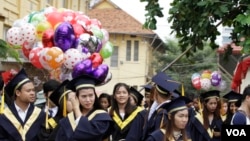In the shade of a tree in the grounds of the iconic Royal University of Fine arts, Saroeun Sothearoth sits quietly, seeking inspiration for a college assignment.
Saroeun is one of the thousands of students who four years ago failed the high school examinations after the government introduced strict new rules to combat cheating in the exams, known locally as the BacII.
In the first year after the anti-cheating measures were introduced by Education Minister Hang Choun Naron, more than 70 percent of students failed the exams. Previously, almost all students engaged in some form of cheating or bribery of teachers in order to pass the tests. Choun Naron had vowed that “only those who are competent will pass” and introduced supplementary exams to give those who failed a second chance.
“You know what, I always got top marks in my classes in high school, so when I learned I did not make it I couldn’t have been more disappointed in myself,” Saroeun said.
But in the years since the new rules were introduced, the number of students passing the exams has increased markedly, suggesting that the tough love regime brought in by Choun Naron may be working. In last year’s exams, almost two-thirds of students passed on their first try.
But Rong Chhun, a consultant to the Cambodian Independent Teachers’ Association, said the exams alone were not a useful indicator of improvement in the quality of education, pointing to the simplification of the exams and reduced difficulty of the problems set in the tests.
“There are still many factors that need to be tackled on the part of the government. Using the term ‘strict exams’ it does not refer to the content of the exams, it [only] means that cheating, bribery and other corrupt acts are not allowed,’ he said.
“Most of the exam exercises within a particular problem solving are not linked; their solutions tend to be independent. Thus, it is not as complicated as before,” he added.
But education spokesman Dy Khamboly said Cambodians should focus on the positives of the scheme, with more students passing with top marks now than ever before, reflecting an “improvement in teaching quality, learning capacity and other education services.”
Whereas prior to the new system there may be only a handful of grade A students each year - who would often receive an award from Prime Minister Hun Sen for their efforts - the number has steadily risen in recent years, with more than 400 students receiving grade A in 2017.
But the ministry claims it has not made the exams easier.
Chuon Naron said the standards were set in accordance with “students’ learning and knowledge levels.”
“There are a variety of standards for the contents. Some standards require that students need to memorize what they learn, some require their critical thinking and understanding while some also need them to apply the knowledge from understanding,” he added. “Other exam content also requires students’ creativity and innovation based on their knowledge level. So this reflects our thorough design of the standards that do not make the exam content easier for students.”
Chhor Ratanak Tepi, recent international studies graduate from the Royal University of Phnom Penh (RUPP), said when she took the exams, in 2014, they did require a high level of critical thinking and a wide knowledge base.
“But the test still lacks standardization in the sense that different professors may have different wording or styles that could slightly affect the student's understanding of the exercise,” she said. “Also, I believe that the content of the exam should gradually involve more critical thinking to maximize the benefit of such a test to students' education and knowledge. But it should, of course, be reflected by classroom experience as well.”
The reforms, however, were seen as implemented too quickly by students at the time, said Sear Vutha, an English major at the RUPP.
“By thoroughly enforcing strict rules of non-cheating on the test-takers, the ministry altered the principles ... from the top. They should have standardized the curriculum and other factors that would have prepared the students better for the state exams. They should have taken a more bottom-up approach,” he said.
One of the driving factors behind the previous regime of bribes and cheating is thought to be the low salaries of teachers, which led them to run classes after-hours and provide students with exam questions ahead of the tests, for a price.
But teachers, while seeing modest raises in their salaries, were not prioritized, some argue, with the wages not rising enough to keep pace with inflation -- a pay cut in real terms.
“The ministry and the government have increased the teachers’ salary to more than $300 [per month] on average. But let’s check how much a liter of gas and a bottle of water would cost; we do need to consider these factors,” Chhun said.
According to the World Bank, teachers in Cambodia also tend to be paid late, which combined with their meager salaries pushes them to offer private lessons to supplement their income, the knock-on effects of which are tiredness and a lack of prioritization of their mandated teaching time.
Despite the problems with the new system, a poll conducted by the Asia Foundation after the reforms were introduced showed that 96 percent of respondents supported the reforms, with about half agreeing that it was “time to start reforming education”.
Vutha, a RUPP English student, however, remains skeptical over the long-term impact of the changes.
“The fact that exam strengthening will lead to improved education remains to be seen, as many other variables, such as teaching quality, school facilities, and curriculum, remain limited,” he said.






